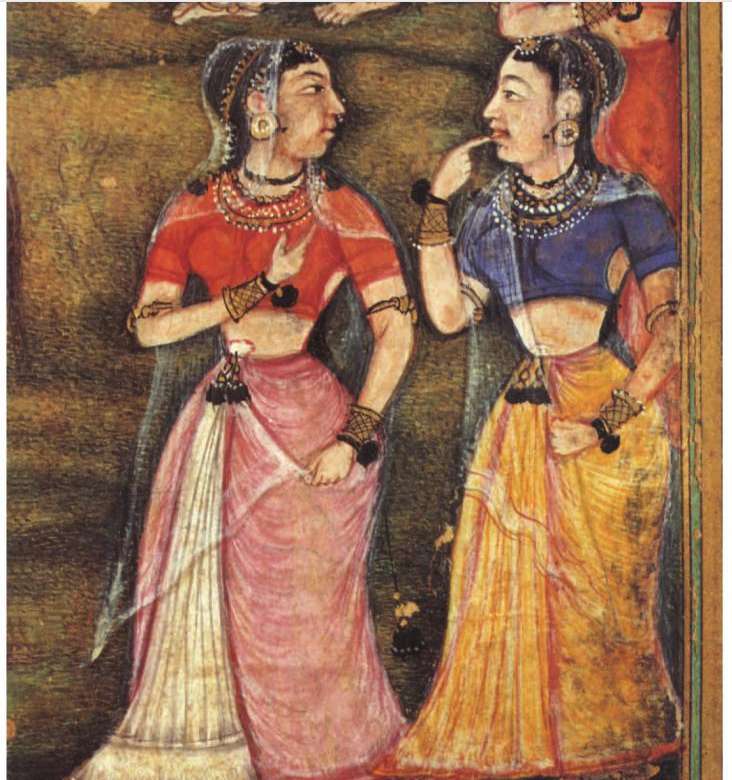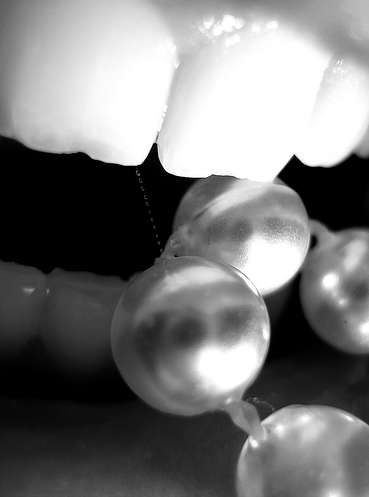FWP:
SETS == EXCLAMATION
FOOD: {6,4}
SKY {15,7}
In its divan version, this ghazal has no opening-verse; the opening-verse of the original ghazal was {50,4x}.
There's a textual disagreement about the present verse. Nazm reads dīdāñ [worms] instead of dandāñ [teeth] (47), as does Bekhud Dihlavi (90), as does Baqir in his first reading (148), as does Chishti (402), as does Mihr (186). As always, I follow Arshi (and Raza), and this time with pleasure-- I think dandāñ makes for fine wordplay, instead of mere repulsiveness. (And of course, Arshi and Raza are the ones who have done far more serious textual research.)
And in fact, without wordplay, what does this verse have to offer? Surely whatever piquancy it has comes from the comparison/contrast between teeth and pearls. (Nazm to the contrary, worms and pearls offer hardly any possibilities at all, as far as I can see.)
Except for Nazm and (following him) Bekhud Dihlavi, the commentators generally invoke the gesture of touching the tip of the first finger of the right hand to the front lower teeth (see the image below); this conveys astonishment, perplexity, bafflement. (For another example of this gesture, see {74,2x}.) This emotion can sometimes shade into 'amazement', ḥairat (on this see {51,9x}), and/or helpless dismay. The teeth are parted to permit the finger to be conspicuously perched there, so that it's possible to imagine that the teeth encircle the finger as if to 'eat' it. Thus people whose finger deserves a necklace made of pearls, are instead condemned to have their finger encircled only by a ring of (pearly) teeth.
On this reading, the image works in several ways. On a literal level, the teeth surround and thus implicitly threaten the finger, as if the finger were encircled by predators. On a metaphorical level, the teeth enable the finger to express stupefaction and dismay. And when the two lines are juxtaposed, the teeth are compared, to their disadvantage, with pearls. Both teeth and pearls are white and shining, but teeth are humble while pearls are aristocratic; teeth are mere body parts while pearls are expensive; teeth are dangerous, while pearls are delicate; teeth just happen to grow, while pe arls are the result of much travail (as for example in {78,2}).
I'm willing to take this as a possible reading. But the literal meaning of rizq as 'food, sustenance' has always struck me strongly. My first impulse is always to read the verse as a melancholy meditation on death-- perhaps a sudden, violent death in which the body might be savaged by the teeth of wild animals and become their literal 'food', or perhaps a slow nibbling to death by the 'teeth' of small insects and worms. Nazm seems to be more or less on my side of the argument-- though his preferred textual reading of dīdāñ , 'worms', goes against Arshi's.
There's no perfect solution. The gesture-of-dismay advocates have to be slightly uncomfortable with the clear sense of rizq as 'sustenance'. Along similar lines, a variant possibility would be Baqir's suggestion that the worthy people are left 'biting their fingers' to express longing and suffering; but this too surely doesn't involve actually eating the fingers and turning them into 'sustenance'. Meanwhile, the food-of-teeth advocates have to be slightly uncomfortable about the off-putting nature of those dandāñ operating after death.
Note for grammar fans: In case anyone finds the grammar of the verse a bit confusing, here's my reconstruction of its ideal prose form:
afsos
kih falak ne [un logoñ kī angusht ko , or else un logoñ ko] dandāñ kā rizq kiyā /
jin logoñ kī angusht darḳhvur-e ʿaqd-e guhar thī .
It's still rather
a stretch, though, to have to insert the whole correlative construction
into the first line in order to justify his relative clause in the second
one. Really the grammar has been excessively tortured here; it's not exactly the most lucid verse in the divan.


Nazm:
Worms [kīṛe] are called dūd ; its plural is dūd , and its collective plural is dīdān . That is, those fingers that were worthy of a string of pearls, the worms have pounced on them and are eating them. A string of pearls has a similitude with worms.
== Nazm page 47